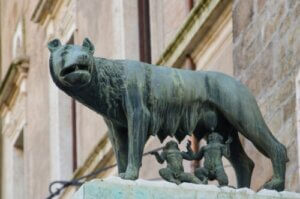Names of Roman Origin for Boys


Reviewed and approved by the psychologist Elena Sanz Martín
Choosing your child’s name requires a lot of time, dedication, and imagination. If you’re not clear about your tastes, it can also become a frustrating task. For this reason, today, we’ll show you several names for boys of Roman origin, along with their meanings. Take note!
Choosing the perfect name according to your tastes
A name is that personal characteristic that accompanies us from birth. In fact, there are those who believe that personality is influenced by it and some parents define their choice based on this factor.
When you don’t know where to start, choosing the name of your future baby can be a complex task. Especially when none of the names that come to mind really catch your attention.
In these cases, it’s best to consult different sources of information about names and their meanings. A good search strategy is to do it following a theme, such as food names, movie names, or names that begin with a particular letter.
You may be interested in: Nordic Names for Babies
According to surveys by the National Statistics Institute (INE), most parents opt for original and little-heard names. However, we still hear some classic names that never go out of style. If you want something that’s more middle-ground, you can choose a name of Latin origin.
30 names of Roman origin for boys
Next, we’ll share with you our 30 favorite names of Roman origin for boys.

Names of Roman origin for boys: from A to M
- Adrian: The Spanish form of the Latin name Hadrianus, which means “he who comes from the sea” or “he who has the sea nearby”.
- Alair: This is a genderless name, a variant of Alaire, meaning “cheerful” or “with wings”.
- Alessio: From Alexius, the adaptation of a Greek verb meaning “defender, protector”.
- Aulo: A very common Latin name in Roman history. Its etymology is popular with a familiar meaning.
- Aurelius: This name comes from the gens or family Aurelia, with the connotations of “resplendent, golden”.
- Cassius: Means “the warrior of the helmet”.
- Caesar: This went from being a name to becoming the honorific title of emperor (Caesar) since Julius Caesar. Its original meaning alludes to the “hair or beard”.
- Claudio: From Claudius, a proper name of illustrious Roman families, whose real meaning is “lame”.
- Clemente: This name comes from the Latin clemens, which means “sweet, benign, good”.
- Christian: This name comes from the word Christianus, “the man who follows God”.
- Dacio: Means “he who comes from Dacia”.
- Elvio: This is a way of saying “the one who is blond”.
- Fabian: A variant of Fabius, it comes from the famous Roman family Fabius and its meaning is ‘farmer’.
- Julio: From Iulius/Iulia, an ancient name that identified the legendary descendants of Aeneas. Its etymology is uncertain, although it’s believed to refer to someone “dedicated or consecrated to Jupiter”.
- Leonel: Comes from the word leonellus, “lion”, and implies “strength, courage”.
- Lucius: From lux, meaning “luminous, resplendent, or born at dawn”.
- Marcus: From the adjective marticus with the meaning “consecrated to Mars”.
- Mario: A common name for the Roman gens or families, meaning “Mars”.
- Mauritius: Meaning “brown”.
See also: 9 Names of Greek Origin for Boys

Names of Roman origin for boys: From N to Z
- Paulo: This name is equivalent to Pablo or Paul and means “the little one”. As indicated in a study developed at the Universitat Autònoma de Barcelona, it’s one of the most used names during the Conquest of the Peninsula.
- Prisco: Means “ancient, venerable”.
- Renzo: This is the name for someone who is “crowned with laurels”.
- Roman: The diminutive of Lorenzo, which comes from laurus and means “field of laurels”. There’s also another alternative meaning which is “he who belongs to Rome”.
- Sergio: Comes from Sergius, “protector, guardian”.
- Servio: This is the translation of Servius, which means “slave”.
- Tiberius: Means ‘he who was born on the Tiber’.
- Tit0: Comes from Titus, “brave defender”.
- Tristan: This is the name of one of the Knights of the Round Table and its meaning also alludes to his love story: “He who does not show his sadness”.
- Valeriano: “healthy, strong, robust”.
- Vicente: From vicens, “the one who wins”.
Have you already picked one out?
We hope this list has cleared up your doubts and that you’ve been able to find the right name for your baby.
If you have decided on one of them… Congratulations! Tell us which one you picked in the comments. If not, don’t worry. You’ll see that when you least expect it, the right name will come to you.
Choosing your child’s name requires a lot of time, dedication, and imagination. If you’re not clear about your tastes, it can also become a frustrating task. For this reason, today, we’ll show you several names for boys of Roman origin, along with their meanings. Take note!
Choosing the perfect name according to your tastes
A name is that personal characteristic that accompanies us from birth. In fact, there are those who believe that personality is influenced by it and some parents define their choice based on this factor.
When you don’t know where to start, choosing the name of your future baby can be a complex task. Especially when none of the names that come to mind really catch your attention.
In these cases, it’s best to consult different sources of information about names and their meanings. A good search strategy is to do it following a theme, such as food names, movie names, or names that begin with a particular letter.
You may be interested in: Nordic Names for Babies
According to surveys by the National Statistics Institute (INE), most parents opt for original and little-heard names. However, we still hear some classic names that never go out of style. If you want something that’s more middle-ground, you can choose a name of Latin origin.
30 names of Roman origin for boys
Next, we’ll share with you our 30 favorite names of Roman origin for boys.

Names of Roman origin for boys: from A to M
- Adrian: The Spanish form of the Latin name Hadrianus, which means “he who comes from the sea” or “he who has the sea nearby”.
- Alair: This is a genderless name, a variant of Alaire, meaning “cheerful” or “with wings”.
- Alessio: From Alexius, the adaptation of a Greek verb meaning “defender, protector”.
- Aulo: A very common Latin name in Roman history. Its etymology is popular with a familiar meaning.
- Aurelius: This name comes from the gens or family Aurelia, with the connotations of “resplendent, golden”.
- Cassius: Means “the warrior of the helmet”.
- Caesar: This went from being a name to becoming the honorific title of emperor (Caesar) since Julius Caesar. Its original meaning alludes to the “hair or beard”.
- Claudio: From Claudius, a proper name of illustrious Roman families, whose real meaning is “lame”.
- Clemente: This name comes from the Latin clemens, which means “sweet, benign, good”.
- Christian: This name comes from the word Christianus, “the man who follows God”.
- Dacio: Means “he who comes from Dacia”.
- Elvio: This is a way of saying “the one who is blond”.
- Fabian: A variant of Fabius, it comes from the famous Roman family Fabius and its meaning is ‘farmer’.
- Julio: From Iulius/Iulia, an ancient name that identified the legendary descendants of Aeneas. Its etymology is uncertain, although it’s believed to refer to someone “dedicated or consecrated to Jupiter”.
- Leonel: Comes from the word leonellus, “lion”, and implies “strength, courage”.
- Lucius: From lux, meaning “luminous, resplendent, or born at dawn”.
- Marcus: From the adjective marticus with the meaning “consecrated to Mars”.
- Mario: A common name for the Roman gens or families, meaning “Mars”.
- Mauritius: Meaning “brown”.
See also: 9 Names of Greek Origin for Boys

Names of Roman origin for boys: From N to Z
- Paulo: This name is equivalent to Pablo or Paul and means “the little one”. As indicated in a study developed at the Universitat Autònoma de Barcelona, it’s one of the most used names during the Conquest of the Peninsula.
- Prisco: Means “ancient, venerable”.
- Renzo: This is the name for someone who is “crowned with laurels”.
- Roman: The diminutive of Lorenzo, which comes from laurus and means “field of laurels”. There’s also another alternative meaning which is “he who belongs to Rome”.
- Sergio: Comes from Sergius, “protector, guardian”.
- Servio: This is the translation of Servius, which means “slave”.
- Tiberius: Means ‘he who was born on the Tiber’.
- Tit0: Comes from Titus, “brave defender”.
- Tristan: This is the name of one of the Knights of the Round Table and its meaning also alludes to his love story: “He who does not show his sadness”.
- Valeriano: “healthy, strong, robust”.
- Vicente: From vicens, “the one who wins”.
Have you already picked one out?
We hope this list has cleared up your doubts and that you’ve been able to find the right name for your baby.
If you have decided on one of them… Congratulations! Tell us which one you picked in the comments. If not, don’t worry. You’ll see that when you least expect it, the right name will come to you.
All cited sources were thoroughly reviewed by our team to ensure their quality, reliability, currency, and validity. The bibliography of this article was considered reliable and of academic or scientific accuracy.
- García-Muñoz SV. Página principal del Centro CIL II [Internet]. Uah.es. [citado el 7 de julio de 2021]. Disponible en: http://www3.uah.es/imagines_cilii/
- INEbase / Demografía y población / Padrón. Población por municipios / Apellidos y nombres más frecuentes / Resultados [Internet]. Ine.es. [citado el 7 de julio de 2021]. Disponible en: https://www.ine.es/dyngs/INEbase/es/operacion.htm?c=Estadistica_C&cid=1254736177009&menu=resultados&idp=1254734710990
- Lopez Barja, P. Epigrafía Latina. Santiago de Compostela: Tórculo Ediciones, 1993, pp. 41-65.
- Meza NEG, Cuenca DD. La significación del nombre. Balajú Revista de Cultura y Comunicación de la Universidad Veracruzana. 2014; 1 (1): 103–33.
- Pena MJ. Apuntes sobre los repartos de tierras en la Hispania republicana y las listas de nombres. Faventia. 1998; 20 (2): 153–62.
- Tibon G. Diccionario etimológico comparado de nombres propios de persona. Rev Mex Sociol. 1957; 19 (2): 550.
- Tomero A. Nombres romanos para niño [Internet]. Madres Hoy. 2020 [citado el 7 de julio de 2021]. Disponible en: https://madreshoy.com/nombres-romanos-para-nino/
This text is provided for informational purposes only and does not replace consultation with a professional. If in doubt, consult your specialist.








